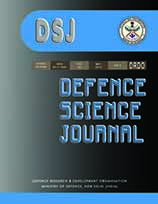Use of BI-Pb-Sn-Cd Alloy in Self-neutralisation Mechanism for Sub-munitions
DOI:
https://doi.org/10.14429/dsj.65.9027Keywords:
Self-neutralisation, unexploded sub munitions, BI-Pb-Sn-Cd alloy, soft metal, sub munitionsAbstract
Unexploded sub munitions for military operations posed economic loss and health hazard. The need for unexploded sub munitons to be rendered safe after a certain period of time was of importance to the militaty. In this work, a self-neutralizing sub-component using soft metal penetration principle was developed and incorporated to the existing sub munitions so as to include a self-neutralizing feature in such sub munitions. This study was also conducted to determine the potential to use a steel wire to cut BI-Pb-Sn-Cd alloy at different temperatures (-40 °C~40 °C). The effect of temperature on neutralisation time was evaluated in experiments. The experimental results indicated that the neutralisation time was dependent on temperature of soft metal and decreased with increasing temperature. While BI-Pb-Sn-Cd alloy with thickness of 0.75±0.01 mm and height of 2.40 ±0.02 mm was cut by steel wire with a diameter of 0.12 mm, self-neutrlisation of sub munitions was completed ranging from 1min5s to 143 h 2 min. It was concluded that self-neutralisation based on BI-Pb-Sn-Cd alloy could meet its setting requirements in the battlefield, and its failure rate reached less than 10% at between -40 °C and 40 °C, and the self-neutralisation time could be adjusted by the size of soft metal.
Downloads
Published
How to Cite
Issue
Section
License
 Where otherwise noted, the Articles on this site are licensed under Creative Commons License: CC Attribution-Noncommercial-No Derivative Works 2.5 India
Where otherwise noted, the Articles on this site are licensed under Creative Commons License: CC Attribution-Noncommercial-No Derivative Works 2.5 India


